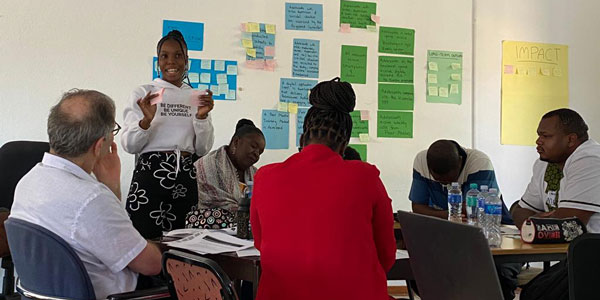Home-grown digital tool could tackle adolescent mental health in Africa
- Wits University
The AfriCAT project has been named a winner of the Mental Health Data Prize Africa.
Spearheaded by the Wellcome Trust and the African Population and Health Research Centre (APHRC), the prize seeks to accelerate innovation in mental health data science on the African continent.
Dr Bianca Moffett at the SAMRC/Wits-Agincourt Unit leads the AfriCAT project, which entails building a first-of-its-kind adaptive testing tool to inform measurement-based mental healthcare for depression and anxiety among adolescents in Africa.
The AfriCAT tool is based on Computerised Adaptive Testing, a novel approach to mental health assessment. Unlike most traditional assessments, which ask a standard set of questions to all users, Computerised Adaptive Tests are based on advanced statistical and machine learning methods, which use a person’s initial responses to select the next best questions. The goal of adaptive testing is to use as few questions as possible while still making an exact assessment, tailored to the individual.
Moffett says, “Adaptive Testing has been used to support mental health in the USA and UK and struck me as having immense potential in resource-constrained environments. Firstly, they offer an efficient way to assess a range of mental health conditions simultaneously. Secondly, by providing more accurate assessment of severity, they could inform appropriate allocation of limited resources. Young people at highest risk can be identified and referred to more intensive support, while those with mild or moderate symptoms could be matched to lay counselling, peer support or digital interventions.”
Mental health professionals and frontline primary healthcare workers could also spend less time on lengthy assessments and more time on patient care. Data from adaptive tests could be used to assist health departments and policymakers plan services, ensuring that resources are directed where they are most needed.
By winning the Mental Health Data Prize Africa, AfriCAT will contribute to a new wave of African-led, data-driven solutions that aim to bridge the mental health treatment gap and support the continent’s growing youth population.
The urgent need for new tools
Adolescence is a unique period of physical, psychological and social development, but is also a period of vulnerability to mental health conditions. Globally, depression and anxiety are leading causes of disability among adolescents. In South Africa, around 20 to 30 percent of adolescents are affected. Left untreated these conditions can become chronic, and may impact social relationships, disrupt education, and increase the likelihood of risky behaviours, self-harm or suicide. As such, early detection and access to treatment can greatly improve outcomes for young people.
Insufficient public expenditure, a critical shortage of professionals, stigma and low mental health awareness serve as major barriers to both detection and provision of effective treatments. The result is that most young people’s depression and anxiety remains undetected and untreated. These gaps are most stark in low- and middle-income countries, where 90% of the world’s adolescents live.
A distinctive strength of AfriCAT is that it is co-designed with adolescents, caregivers, educators and frontline workers in South Africa and Kenya, including adolescents with personal lived experience of depression and anxiety.
The team is engaging directly with adolescents to gain a grounded understanding of what it means to live with depression and anxiety during these formative years, creating space for young people to contribute their design inputs, and ensure the tool feels approachable, and is something they would want to use or recommend to others.
Alongside adolescents, the team is reaching out to other stakeholders, including policymakers, healthcare workers, educators, and parents. Their input will shape how the tool is implemented, ensuring it brings real value to those who may eventually support its use it in schools, clinics, or other community settings.
“This collaborative approach is essential to making sure AfriCAT is not only technically robust, but also feasible, acceptable and ready to be embedded in existing services” says Moffett.
Dr Sylvia Muyingo, convenor of the Mental Health Data Prize Africa at APHRC, says, “Without beneficiary involvement, tools by themselves do not provide adequate mental health solutions.”
By creating a contextually relevant test rooted in lived experience, AfriCAT not only supports better detection but also empowers adolescents, families and frontline workers with access to the mental health resources they need.
Building on earlier success
The AfriCAT project builds on the foundations of the DoBAt Study, a collaboration between Wits, Oxford, UCLA, and several other institutions that tested digital delivery of behavioural activation therapy through an app together with telephonic support from peer mentors. DoBAt demonstrated that technology and peer support can overcome significant barriers to access in resource-constrained settings.

AfriCAT extends these lessons into the next frontier: more personalised, precise, and efficient assessment of mental health needs to inform provision of tailored support.
Ekin Bolukbasi, Data Prize Manager at the Wellcome Trust, says, “This prize demonstrates our commitment to building a world where no one is held back by mental health problems. It aims to advance mental health science by transforming how existing challenges are addressed in Africa by using data insights or tools for prevention, management and treatment. Together, we have the opportunity to improve understanding of the trajectory and resolution of common mental disorders for a better and more resilient future for all.”
Innovation in measurement-based mental healthcare is central to AfriCAT’s vision. The tool holds real potential as a scalable solution for African contexts and other low-resource settings, where health systems urgently need efficient, evidence-based solutions.

